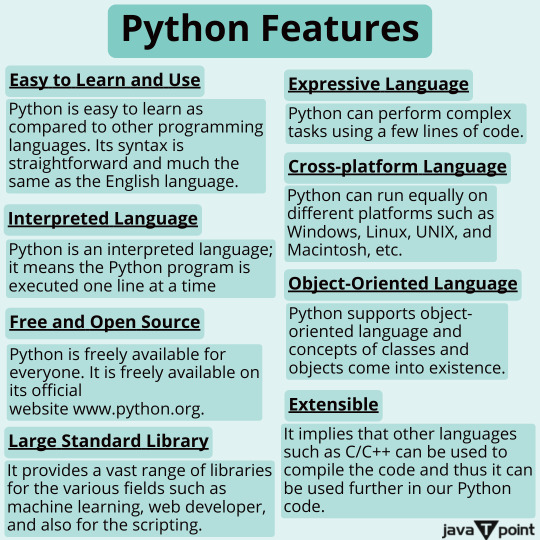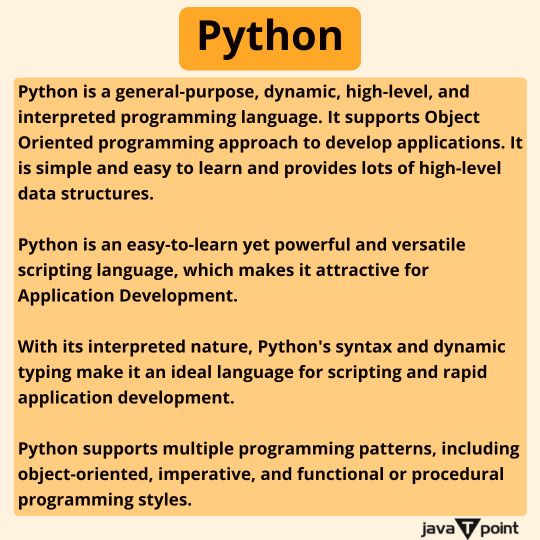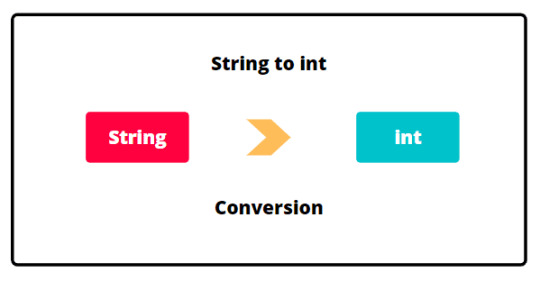#javatpoint
Text
Object-Oriented Programming in Java
Hello! Just passing by real quickly.
Here's a Notion page I created a while back during my college Java course, dedicated to the concept of Object-Oriented Programming in Java.
I made it so simple and fun to read , hope it helps someone out there
Happy coding!
#java development company#software#code#javatpoint#developers#codeblr#css#html#javascript#studyblr#progblr#programming#comp sci#web design#web developers#web development#website design#webdev#website#tech#html css#learn to code#resources
55 notes
·
View notes
Text

Python Features
.
.
.
.
for more information
https://bit.ly/3RVzj16
check the above link
#aspdotnet#python#adodotnet#csharp#java#dotnet#dotnetdeveloper#dotnetframework#dotnetclasses#dotnetclasslibrary#computerscience#computerengineering#programming#javatpoint
12 notes
·
View notes
Text
Making a compiler
Every programmer out there, new or experienced longs for a chance to create their own programming language and compiler. I am no exception. Months ago I decided to fork an old project on github and develop it in my image. The project was a golang-like unfinished compiler, so I dug in and made changes. I changed the language to resemble a subset of rust, go and ocaml. I plan to add a LLVM backend inspired by the tre golang compiler. I will continue working on it until it kinda works. I still have a lot to do. check out the project on the link below. If you want to contribute submit a pull request.
#golang#programming#rustlang#compiler#programming languages#c++#typescript#java#javascript#javaris x#java development company#javatpoint#software#developer#sql#open source#python
11 notes
·
View notes
Text
2 notes
·
View notes
Text
ECC: Excise Control Code
ECC stands for Excise Control Code. It is a PAN-based 15-digit alphanumeric registration number given to all who are liable to pay excise duty under Central Excise Act.
2 notes
·
View notes
Text
Coding mastery unlocked: Embrace the power of encapsulation!🧑💻 Join us as we delve into this fundamental OOP concept and discover how it can revolutionize your code structure.🚀💻
#education#interview#technology#coding#student#information technology#developers & startups#programming#software#science#javaprogramming#javatpoint#javajunkie#python#javaris x#javascript#developer#engineering
0 notes
Text
TESTING TOOL (Manual,Java,Selenium).

#business#college#education#student#technology#javascript#java full stack training#javatpoint#javaprogramming#java full stack developer#developer#selenium
0 notes
Text
Navigating the World of Java Training and Placement: A Comprehensive Guide
Java remains a cornerstone programming language, powering a myriad of applications and systems across industries. As businesses increasingly adopt Java-based solutions, the demand for skilled Java developers continues to surge. Consequently, individuals seeking to enter or advance in the field of software development often find themselves drawn to Java training programs.
Java training courses not only equip learners with essential programming skills but also provide avenues for securing lucrative job placements. In this comprehensive guide, we delve into the realm of Java training and placement, exploring the key aspects, benefits, and considerations for aspiring Java developers.

Understanding Java Training
Java training programs encompass a wide range of courses tailored to suit various skill levels, from beginners to experienced developers. These courses typically cover fundamental concepts such as syntax, data types, control flow, object-oriented programming principles, and advanced topics like multi threading, networking, and database connectivity.
Whether offered through traditional classroom settings or online platforms, Java training modules are designed to provide hands-on experience through practical exercises, projects, and assessments. Moreover, many training programs incorporate real-world scenarios and industry-relevant projects to simulate the challenges faced by Java developers in professional settings.
Benefits of Java Training
Versatility: Java's versatility enables developers to create applications ranging from web and mobile apps to enterprise software and embedded systems. By mastering Java through training programs, individuals gain the skills to tackle diverse projects across various domains.
Career Opportunities: Java developers are in high demand across industries, including finance, healthcare, e-commerce, and telecommunications. Completing a Java training program significantly enhances one's employability, opening doors to a multitude of job opportunities with competitive salaries and benefits.
Industry Relevance: Java remains one of the most widely used programming languages globally, with a vast ecosystem of frameworks, libraries, and tools. Training in Java ensures that developers stay relevant in the ever-changing tech industry and are equipped to adapt to new advancements and challenges.
Community Support: The Java community is vibrant and expansive, comprising seasoned professionals, enthusiasts, and experts willing to share knowledge, resources, and best practices. Engaging with the Java community fosters continuous learning and networking opportunities, enriching the training experience.
Choosing the Right Java Training Program
With a plethora of Java training course available, selecting the right program can be daunting. Consider the following factors to make an informed decision:
Curriculum: Evaluate the course curriculum to ensure it covers essential Java concepts comprehensively, including both foundational and advanced topics. Look for programs that offer hands-on projects and assignments to reinforce learning.
Instructor Expertise: Research the credentials and experience of the instructors leading the training program. Experienced instructors with industry expertise can provide valuable insights and mentorship throughout the learning journey.
Learning Format: Determine whether the training program offers flexibility in terms of learning format, such as self-paced online courses, instructor-led classes, or blended learning options. Choose a format that aligns with your learning preferences and schedule.
Reviews and Testimonials: Read reviews and testimonials from past participants to gauge the effectiveness and quality of the training program. Positive feedback from alumni indicates the program's credibility and success in preparing individuals for Java-related roles.
Certification and Accreditation: Consider whether the training program offers certifications or accreditation recognized by industry leaders and employers. A certification from a reputable institution enhances your credibility and marketability as a Java developer.
Placement Assistance and Career Support
Many Java training programs offer placement assistance and career support services to help graduates secure job opportunities post-training. These services may include:
Resume Building: Assistance in crafting a professional resume tailored to highlight your Java skills, projects, and achievements.
Interview Preparation: Guidance and mock interview sessions to prepare you for technical interviews, coding assessments, and behavioral interviews commonly conducted by employers.
Job Placement Services: Access to job boards, recruitment networks, and partnerships with companies seeking Java developers. Some training providers may facilitate direct referrals and job placements based on your skills and preferences.
Alumni Network: Joining an alumni network of fellow Java developers who have completed the training program can provide valuable connections, mentorship, and job referrals throughout your career.
Final Thoughts:
In the competitive landscape of software development, acquiring proficiency in Java through comprehensive training programs is instrumental in securing rewarding career opportunities. By investing in Java training and placement services, individuals can embark on a fulfilling journey towards becoming skilled Java developers, equipped to thrive in the dynamic tech industry.
Whether you're a novice programmer looking to kickstart your career or an experienced developer seeking to upskill and advance, Java training programs offer the knowledge, resources, and support needed to achieve your goals. With dedication, perseverance, and the right training program, you can embark on a successful career path in Java development, making meaningful contributions to the world of technology.
#java online training#javascript#javaprogramming#javatpoint#coding#javatutorial#software#technology#education#it#study blog
0 notes
Text
Java full stack training institute in Hyderabad | Ameerpet Technologies
Are You looking for Best Java full stack training institute in Hyderabad, Ameerpet technologies provide Online and Offline Training Java Course.Enroll in our Java Full Stack Developer course in Hyderabad designed by the industry experts from IITs and Top MNCs. With a curriculum designed based on the company’s skill requirements, become job-ready with an Industry-ready certificate.

#c language training in ameerpet#java full stack training#javascript#javaprogramming#javaris x#javatpoint#javajunkie#python#coding#developer#programming#php
0 notes
Text
Computer Programming Language Training and Placements by DOCC Kolkata
Computer Programming Language online and offline Training ( PHP, PYTHON, NODE JS, JAVA-JAVASCRIPT, etc.,) from grass route level incl. Data structure, Algorithm, Program Coding, etc. And Projects for Assured Placements in the IT Sector by DOCC Kolkata, Lake Gardens.
If interested please call 9433526196. Visit www.docckolkata.com
#coding#angular#training#laravel#php#placements#php training#php programming#phpwebsitedevelopment#php framework#java script#python#javajunkie#javaprogramming#javatpoint#javascript#reactjs#sql#django#nodejs
0 notes
Text

Python
.
.
.
.
for more information
https://bit.ly/3M18CUZ
check the above link
#aspdotnet#python#adodotnet#csharp#java#dotnet#dotnetdeveloper#dotnetframework#dotnetclasses#dotnetclasslibrary#computerscience#computerengineering#programming#javatpoint
8 notes
·
View notes
Text
“Any application that can be written in JavaScript, will eventually be written in JavaScript.” - Jeff Atwood
#c++#c++ language#c++ programming#golang#typescript#programming#java#javascript#javatpoint#java development company#software#developer
3 notes
·
View notes
Text
Java String to Int: A Comprehensive Guide for Developers
Introduction to Java String to Int: In the world of Java programming, converting strings to integers is a common task that developers encounter frequently. Whether you're parsing user input, manipulating data from external sources, or performing calculations, understanding how to convert strings to integers is essential.

In this comprehensive guide, we'll explore the various techniques, best practices, and considerations for converting strings to integers in Java.
Understanding String to Int Conversion: Before diving into the conversion process, it's important to understand the difference between strings and integers in Java.
Strings are sequences of characters, while integers are numeric data types used to represent whole numbers. The process of converting a string to an integer involves parsing the string and extracting the numerical value it represents.
Using parseInt() Method: One of the most common methods for converting strings to integers in Java is the parseInt() method, which is part of the Integer class. This method takes a string as input and returns the corresponding integer value. It's important to note that parseInt() can throw a NumberFormatException if the string cannot be parsed as an integer, so error handling is essential.
Example:
String str = "123"; int num = Integer.parseInt(str); System.out.println("Integer value: " + num);
Handling Exceptions: As mentioned earlier, the parseInt() method can throw a NumberFormatException if the string is not a valid integer.
To handle this exception gracefully, developers should use try-catch blocks to catch and handle the exception appropriately. This ensures that the application doesn't crash unexpectedly if invalid input is provided.
Using valueOf() Method: In addition to parseInt(), Java also provides the valueOf() method for converting strings to integers. While valueOf() performs a similar function to parseInt(), it returns an Integer object rather than a primitive int. This can be useful in certain situations where an Integer object is required instead of a primitive int.
Example:
String str = "456"; Integer num = Integer.valueOf(str); System.out.println("Integer value: " + num);
Considerations and Best Practices: When converting strings to integers in Java, there are several considerations and best practices to keep in mind:
Always validate input strings to ensure they represent valid integers before attempting conversion.
Handle exceptions gracefully to prevent application crashes and improve error handling.
Use parseInt() or valueOf() depending on your specific requirements and whether you need a primitive int or Integer object.
Consider performance implications, especially when dealing with large volumes of data or performance-critical applications.
Conclusion: Converting strings to integers is a fundamental task in Java programming, and understanding the various techniques and best practices is essential for developers.
By following the guidelines outlined in this comprehensive guide, you'll be well-equipped to handle string to int conversion efficiently and effectively in your Java projects. Happy coding!
1 note
·
View note
Text
The Understanding Associations in Java: A Comprehensive Guide
Associations in Java are like friendships between different classes. Just like people can have various relationships with each other, classes in Java can also have different kinds of connections. Let's dive into these connections in an easy-to-understand way.
What Are Associations?
Associations in Java are all about how classes work together. Imagine you have classes representing different things, like a 'Person' class and an 'Address' class. Associations help these classes communicate and interact with each other.
Types of Associations:
One-to-One Association: This is like having a best friend. Each person is connected to only one address, and each address is linked to only one person.
One-to-Many Association: Picture a teacher having many students in a class. The teacher (one class) is connected to many students (many instances of another class).
Many-to-Many Association: Think of students taking multiple classes, and each class having many students. It's like a big network where many students are connected to many classes.
How Do We Make Associations in Java?
We make these connections using something called instance variables. It's like saying, "Hey, this class knows about that class!" For example, in a one-to-one association between 'Person' and 'Address':

Why Associations Are Cool:
Sharing Is Caring: Just like sharing with friends makes life more fun, sharing code between classes through associations makes programming more efficient and enjoyable.
Easy to Understand: Associations help break down big problems into smaller, understandable parts. It's like solving a puzzle with friends—each piece fits together to make the big picture.
Flexibility: Associations allow our code to grow and change easily. If we need to add more friends (classes) to our circle, associations make it simple.
In a nutshell, associations in Java are like friendships between classes. They help classes work together, share information, and make our code easier to understand and manage. So, next time you're writing Java code, remember that associations are your friends, making your programming journey smoother and more enjoyable.
if you like to learn and explore technology visit analyticsjobs.in . analyticsjobs has a resolution to your every question.
0 notes
Text
java course in chandigarh
Excellence Academy in Chandigarh offers a comprehensive Java course designed to provide students with a strong foundation in Java programming. This course is suitable for beginners as well as those with some prior programming knowledge.
java course in chandigarh at Excellence Academy covers all the essential concepts of Java programming, including variables, data types, control structures, arrays, classes, objects, inheritance, polymorphism, exception handling, file handling, and more. Students will also learn about important Java frameworks and libraries.
The course is taught by experienced instructors who have a deep understanding of Java programming and its practical applications. They follow a structured curriculum that combines theoretical knowledge with hands-on coding exercises and projects. This approach helps students develop a solid understanding of Java programming principles and gain practical experience in solving real-world problems.
Excellence Academy provides a conducive learning environment with well-equipped computer labs and resources to support the learning process. Additionally, they offer flexible class timings to accommodate the needs of working professionals and students with busy schedules.
0 notes